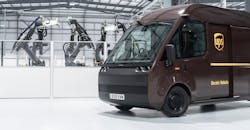When Arrival first exited the stealth mode so many tech-oriented companies embrace as they perfect their offering, it announced a significant order from UPS. Now, the London-based firm, founded in 2015, is announcing a meaningful step in delivering on its commitment to create purpose-built battery electric vans for the global delivery giant. Specifically, Arrival announced Wednesday that it will be building its second US microfactory to produce electric delivery vans. With initial production scheduled for Q3 2022, Arrival expects to bring more than 250 new jobs to Charlotte and Mecklenburg County.
The new microfactory will be located in West Charlotte, North Carolina, near Charlotte Douglas International Airport, at Meadow Oak Commerce Center. Arrival is investing approximately $41.2 million in the modern production center that can assemble up to 10,000 electric delivery vans each year. Last fall, Arrival announced it would be opening a microfactory facility for its electric buses in Rock Hill, SC and in December 2020, announced it would establish its North American headquarters in South End, creating over 650 jobs in the Charlotte region.
“We’re excited by this significant milestone that will enable UPS to economically deploy electric vehicles throughout our global operations at an increasing pace,” said Luke Wake, vice president of maintenance and engineering, UPS Corporate Automotive, in a statement. “At UPS, we’re laser focused on finding operational efficiencies. Establishing factories that can quickly serve both the European and North American markets is a masterful use of logistics. We can’t wait to see UPS’s new electric vehicles roll out of this factory as this is also one of many paths UPS is taking to reduce its CO2 emissions.”
While this new facility and the previously announced Rock Hill location will produce different vehicles, there are no outstanding differences in capabilities or design, Michael Ableson, CEO, Arrival Automotive tells IndustryWeek. "Both microfactories will utilize Arrival’s cell-based assembly to create our zero-emission vehicles. This Charlotte-based microfactory will initially be focused on producing two different classes of EV Vans, while the Rock Hill microfactory will initially be focused on bus production," he says. "That'll lead to some tweaks and differences in the internal set up between the two — based on the different physical sizes of the products."
Arrival has been quite busy since surfacing last year, and Abelson explains that more milestones are on the horizon. "After this microfactory announcement, Arrival will be moving to finalize its merger with CIIG and become a public company listed on NASDAQ," he says. "We remain in execution mode, as we begin bus trials with First Bus and van trials this summer and fall." Abelson also mentioned a few more partnership announcements in the near future.
Arrival’s ability to create vehicles with a competitive price point to fossil fuel equivalents and lower Total Cost of Ownership, stems from their pioneering new method of design and production. Arrival’s vertically integrated approach uses in-house developed hardware and software and combines it with assembly in microfactories. The microfactories are low CapEx, have a smaller footprint than conventional factories, have the ability to create significant unit economics and can be placed all over the world to serve local communities, bolstering local communities and economies.
Arrival is currently in the process of scaling its microfactory footprint in the US and Europe, and remains on track to accelerate this with the capital raised from its public offering. "We plan to ramp up the numbers of our Microfactories from three to 31 by the end of 2024," says Abelson. "For our US and European sites, we are expanding our workforce and hiring, as we plan for deliveries of the zero-emissions Buses to start in Q4 2021 and the Vans in Q3 2022."
About the Author
Peter Fretty
Technology Editor
As a highly experienced journalist, Peter Fretty regularly covers advances in manufacturing, information technology, and software. He has written thousands of feature articles, cover stories, and white papers for an assortment of trade journals, business publications, and consumer magazines.
